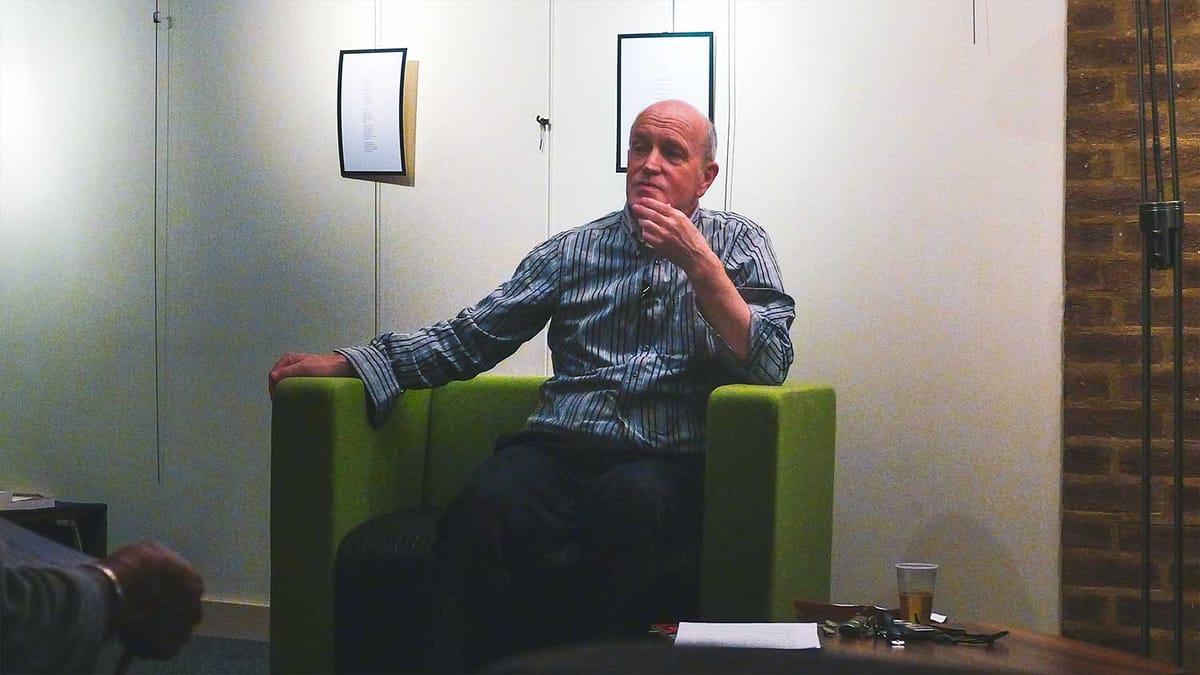The Writing Craft, the Formidable Iain Sinclair, Allen, Sedaris
A creation that none but the creator may comprehend has been performed only once ever, by the Creator of creators, and who may dare to rise to His bar?

Last week, I put out a 1500-word piece written by me. A dozen young and exceptional folks peered into the quarters of my creation and shook their heads sideways, which as you know is bad news in Europe. The thing moved back and forth. The job could have had a few people less, some said. A sentence stumbled, and another had a little fracture, a few others felt. I gathered up the mess and brought it to my flat and looked over it and turned and smiled wickedly into the cold and gloom outside my window. "Henceforth, anything I write shall be written only for me, to be understood by none but me," I told myself, and went to bed delighted at the notion and woke up laughing in the morning—most unusual, and if my wife were around, she'd have looked for something to douse me with. A creation that none but the creator may comprehend has been performed only once ever, by the Creator of creators, and who may dare to rise to His bar? After a fortifying breakfast I sobered up and opened a book on the writing craft. I'm reading it still, and, in a pause between chapters, this post.
How do I spend time in this small town, on this campus hemmed into itself by this gathering cold? By looking to Sedaris, for how he lived it up while in Paris. He didn't go the Notre Dame. He didn't haunt the Closerie des Lilas or the Café des Flores or any of the places where Hemingway and Joyce and the others drank and where Hemingway famously wrote. Nor did Sedaris go to the cemeteries, or down into the sprawling Paris underground where there are even higher numbers of the Parisian dead, or Jazz at the Le Caveau de la Huchette. Sedaris merely went to the movies, enjoying the experience, he says, of watching them with European audiences. On my part, I watched Anna Karenina last week at the campus theatre. And felt happy that Karenin, the husband, is bearable in this very differently conceptualised version. The next two days I went to About Elly, and To Rome with Love. Woody Allen's film has flashes of his brilliance, and I laughed when the man was himself on screen, but I saw that even the great Woody Allen can let slip a flawed creation. I nodded sideways leaving the Gulbenkian, the on-campus theatre, but I thought immediately of Allen's *Midnight in Paris* and stayed a fan. As regards About Elly, I decided that I must cultivate Asghar Farhadi, but who struck me more was the talent of beautiful Golshifteh Farahani, of whom I'd known nothing until this film.
I'm a regular at the Tuesday readings at the university, to which the big writers come. Last week it was Iain Sinclair, and I was ten feet from him, and not believing it. When the time came to ask questions, and even speak with the great man in the cosy university hall, but I threw away the golden moment and hurried to my flat, clutching a just-bought-and-autographed book, preferring comfort in reading the book to meeting the formidable writer of it.
Which brings me to the question, what kind of a writer am I going to be?
But there's Sedaris, and there's Me Talk Pretty One Day, Sedaris's essay written for precisely me.
I'm smiling all the time, actually.
Pictured above: Iain Sinclair at the University of Kent, shot by me.